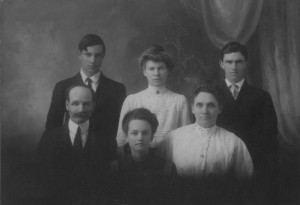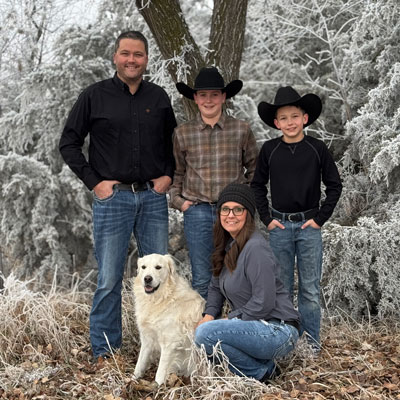By Mrs. Mary Price Jeffords
In the fall of 1881, I taught the home school in Ohio and in the meantime I read all the homestead laws I could get. I did not see why a girl could not do anything a boy could. School closed the middle of March, it being only a seven months terms.
Start For Nebraska
My sister, Agnes, later Mrs. D.O. Brown, and I, later Mrs. C.H. Jeffords, after many talks, decided to go to Nebraska.
We spent the entire summer in Lincoln and after the fall election went to Seward where Agnes and I secured schools to teach near that town. I had a three and Agnes a four months term.
After finishing my term of school, I went to Westerville where we had some old friends. I looked over the country there but found nothing that looked good. The next week Mr. Longfellow, John, Ed and Mary came along and I arranged to go back to Seward with them.
Bought Team and Outfit.
Agnes had finished her school at Seward and we decided to buy a team and wagon for $350.00 and drive to Custer county.
We bought our outfit from a man named Brock. When we got started west, we went along nicely until our wagon began to scream. I did not know what that meant. A man was coming toward us, and he up with his whip and demanded us to stop. He said, “Do you know you are ruining that wagon? It needs grease.” I asked what we would do as we were a long way from Grand Island. He spoke quite sharply and said, “One of you get out and hold my team and I will grease it for you.” When that was done, he said, “The next town is Grand Island. Get a box of grease and use it.” When we got to Grand Island, I made for a shop that sold grease, and Agnes went to look for a stove.
We got a hundred pounds of flour, a sack of cornmeal, a sack of graham flour, a slab of bacon, fifty pounds of sugar and spices of all kinds, a tub, an ax, a hammer, a saw which the boys said was no good–dishes, a hoe, rake, bucket and everything we could think of that we might need.
After we got all our things loaded we started for Broken Bow. The first night we stopped at Fletchers, in Sherman county. The next night we spent at the home of a family named Jenkins in Lee Park — the man was called “Polecat” Jenkins. I asked why he was called “Polecat” and they told us that during the hard winter he killed polecats to make a living. Mrs. Jenkins was a mother I was proud to know. She doctored me for a sore throat and did all she could to help us.
The next morning Lem Gandy came along. He took me to Westerville and we stopped at Dunlaps for two days, resting our team. When we got to the Charley Jeffords place my father, J.R. Price, brother, John, and uncle, Wood Price, were there. They wanted to know how we had thought of so much stuff when neither one of us had ever used an ax at all and a hoe very little.
One Sod House on Two Claims
Agnes and I filed on claims adjoining and we had the boys build a house across the line for us so that we could each eat on our own land. I did not take a homestead, but took a pre-emption and told my brother, John, he could have it when he was old enough. He was nineteen then.
Taught New Helena School
Agnes and I began looking for work. Preacher Jackson came and offered Charley Jeffords $40.00 a month to teach. Jeffords was going to Iowa for the winter, and later Mr. Jackson offered me $30.00 to do the same work. I told him no, that I could do just as well as Jeffords. Then Mr. Bathrick came and offered me $30.00 and I found that to be one of the nicest neighborhoods in the county, near New Helena. I stayed there five months.
The first of October, Agnes and I took our team and went to Mason City to see County Superintendent Amsberry. We found their home to be a lovely one and made friends with Mrs. Amsberry, Minnie, Amy and the rest of the family. We still look forward each year to going to the Home Coming to meet our many friends there.
On our way home from Mason City, we stopped at the home of a man by the name of Shaw. He had a nice lot of potatoes, and I asked if he would sell us ten or fifteen bushels of them. He sold us fifteen bushels at thirty cents per bushel. We also got some cabbage and squashes, in all spending $5.00.
Got Lost and Camped for the Night
It was dark by the time we got started on our way again, and we got onto the Ash Creek road and became lost, so we decided to camp for the night. We let the horses pick around. About 4:00 a.m. I told Agnes I would take the back track and that way we could find where we were. When I finally found my way, I was at the Dan Lewis place near Broken Bow, then I started home. When the sun cam up, Agnes started out and found the Boss Neth place. I got home about one o’clock. After that we were very careful when we went out on the prairie with no roads to follow.
Agnes A Good Shot
Agnes was good with a gun. She could kill a prairie chicken or any other wild thing, and in fact, did. I could not hit anything so she kept meat in the house while I did the washing and baking, for we could not run to the bakery as we do now.
They called Mr. Jeffords the “Lone Man” for he was the only one between Callaway, Arnold, and Broken Bow. That winter, 1883, Wood and John Price and Charley Jeffords spent the winter together. They got wood out of the canyons for fuel. Agnes and I taught school but we came home for Christmas.
That winter I inquired who in the district had a hog for sale, and Jim Forsyth wrote me that he had one he would sell for six cents a pound, dressed. I agreed to take it and when Wood Price came for me he asked if I planned to feed the entire county. When I asked his reason for thinking that, he told me I had bought five hundred pounds of meat and the man had dumped it into his wagon and left. What could I do? I had to spend my month’s wages for meat, and fat meat at that. The boys never got through guying me about my hog. My uncle and brother and Agnes and I were gone most of the time. We sold $12.00 worth of the meat and the rest we fried down and made sausage and lard.
Mary and Charley Get Married
After Christmas I did not get back until the first of March. Wood came after me about April 10 and Mr. Jeffords took me back April 16. He said we would go by way of Broken Bow. We did and were married by Judge Benjamin. Mr. Jeffords took me on to school and then went back home to work. We thought we were very smart and and would not let anyone know of the marriage until school closed. I did not see him again until the last week of May when he came for me.
Early Wedding Presents
The neighbors had some gifts for me: Mrs. Frank Cozad, a Newfoundland pup which I called “Bingo”; Mrs. Bob Farritor, three blooded chicks; Mrs. Jacobs, a hen and twelve chicks; Mrs. Ross, twelve chicks; Mrs. Isaac Merchant, a jar of plum butter; Mrs. J.H. Bathrick, two sheets and Mrs. W.O. Bowley a jar of butter. Mr. Jeffords wanted to know what all this meant, and I told him that everything was useful and I would far rather have these things than something I must put up and look at.
Jeffords Gave Writing Lessons.
During the year, 1883, Mr. Jeffords gave writing lessons to a number of people who came to his home for instruction. Among them was Boss Neth, who could write in German but not one word in English. In a few evenings he mastered the art well enough to write to his wife in Illinois, telling her to come out west where he had found a home. The wife, Alice, came with their two children, and we formed a friendship that lasts until this day.
During the year, I had my first experience in laying out the dead. Our neighbor’s child, Belle Hill, a young child, passed away, and when I went to the home and took an inventory things looked very discouraging. However, we sent for some of the neighbors, who came and brought food and aided. Hers was the first grave in the Broken Bow cemetery, as you will learn if you look up the history of the cemetery.
The first county fair in Broken Bow was held just east of the courthouse. People from all parts of the county came and enjoyed the fair and ate their dinners in the shade of the wagons.
In the fall of 1884 the Finch-Hatton boys brought me a dog. They were going back to England and were determined to leave the dog in a good home. They had invested some thirty or forty thousand dollars in cattle, but had lost it all and were returning to their native land. I asked them why the names were joined and they said it was because the Finch-Hatton estates had been joined.
During the fall of 1886, John Price and his wife moved into the Loup country. Their home was partly a dug-out and partly sod. The snakes were very bad, and one night Mrs. Price felt something crawling on the bed. She thought it was a mouse but next morning was greatly surprised to find a big bull snake curled up asleep on the bed. She did not stay long in that place.
Emerson Purcell, a Wild Little Devil
In the fall of 1886 Dad Price came home and said, “Jeffords, there’s a nineteen year old kid starting a paper at Merna. He is Emerson Purcell, George Purcell’s boy, and his paper is called the Merna Record. He is a bright kid but they tell me he is a wild little devil and I don’t believe he can make it go.”
Well, you all know what Emerson Purcell has accomplished in Custer county and that his Custer County Chief is widely known. I guess you can’t tell what is in a boy when he first starts out.
What a time we had when the first train came to Broken Bow! We were very proud of our county and the people in it. I do not believe you will find a place where the people were as loyal as they were in Custer county at that time.
Source:
Pioneer Stories of Custer County, Nebraska
Pages 74-76


